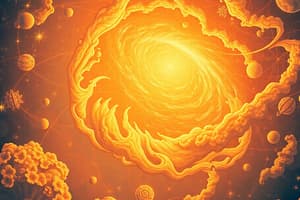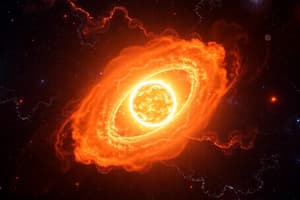Podcast
Questions and Answers
What is the primary idea behind the Big Bang Theory?
What is the primary idea behind the Big Bang Theory?
- The universe is static and unchanging.
- The universe has always existed in its current form.
- The universe started from a large explosion.
- The universe began with a small singularity and expanded. (correct)
Who was one of the first to propose a scientific idea of the Big Bang?
Who was one of the first to propose a scientific idea of the Big Bang?
- George Gamow
- Arno Penzias
- Ralph Alpher
- Georges Lemaître (correct)
What evidence did Arno Penzias and Robert Wilson discover in the 1960s?
What evidence did Arno Penzias and Robert Wilson discover in the 1960s?
- Primordial helium
- Expansion of the universe
- Redshift of distant galaxies
- Cosmic background radiation (correct)
What does redshift indicate when observing distant objects in space?
What does redshift indicate when observing distant objects in space?
Which element was detected as evidence supporting the Big Bang Theory?
Which element was detected as evidence supporting the Big Bang Theory?
What does blue shift indicate about an object in space?
What does blue shift indicate about an object in space?
How long ago is it estimated that the Big Bang occurred?
How long ago is it estimated that the Big Bang occurred?
Which scientific concept is supported by the detection of cosmic background radiation?
Which scientific concept is supported by the detection of cosmic background radiation?
What discovery did Edwin Hubble make that contributed to the understanding of the universe?
What discovery did Edwin Hubble make that contributed to the understanding of the universe?
Which elements are primarily produced during Big Bang nucleosynthesis?
Which elements are primarily produced during Big Bang nucleosynthesis?
What is deuterium?
What is deuterium?
What phenomenon limited the formation of deuterium during the universe's early moments?
What phenomenon limited the formation of deuterium during the universe's early moments?
Which of the following reactions can produce helium-4?
Which of the following reactions can produce helium-4?
What essential role does hydrogen play in nucleosynthesis processes?
What essential role does hydrogen play in nucleosynthesis processes?
What is the significance of the binding energy in nucleosynthesis?
What is the significance of the binding energy in nucleosynthesis?
What is the primary outcome of the Big Bang nucleosynthesis process?
What is the primary outcome of the Big Bang nucleosynthesis process?
Flashcards are hidden until you start studying
Study Notes
The Big Bang Theory Overview
- The Big Bang Theory explains the universe's origin, starting from a small singularity and expanding over approximately 13.7 billion years.
- Georges Lemaître, a Belgian cosmologist and priest, first presented the theory in scientific form in 1931.
- Further development of the theory was contributed by George Gamow, Ralph Alpher, and Hans Bethe.
Evidence Supporting the Big Bang Theory
-
Cosmic Microwave Background (CMB):
- Detected in the 1960s by Arno Penzias and Robert Wilson using a 6-meter radio telescope.
- The cosmic background radiation indicated a uniform temperature slightly above absolute zero, consistent with predictions of post-Big Bang radiation.
-
Detection of Primordial Helium:
- Detection occurred during the Astro-2 mission (STS-67) aboard the Space Shuttle Endeavour, confirming the presence of helium produced in the early universe.
-
Redshift Observations:
- Redshift occurs when objects move away, stretching light waves into lower frequencies, indicating distance and universe expansion.
- Conversely, blueshift indicates objects moving towards us, compressing light waves into higher frequencies.
Expanding Universe
- Measurements demonstrate that the universe is expanding, with galaxies observed moving away from one another.
Edwin Hubble's Contributions
- Edwin Hubble was a pivotal figure in extragalactic astronomy and observational cosmology.
- He discovered that many nebulae were actually galaxies outside the Milky Way, shaping modern understanding of the universe's scale.
Big Bang Nucleosynthesis (BBN)
- BBN, or primordial nucleosynthesis, refers to the formation of light elements during the Big Bang's expansion, producing hydrogen, helium isotopes, lithium, and beryllium.
- The deuterium bottleneck occurs at high temperatures when protons and neutrons combine to form deuterium, a hydrogen isotope.
- As temperatures decrease, deuterium can stabilize and catalyze further fusion reactions, leading to:
- Production of helium-3 and tritium from deuterium fusion.
- Formation of helium-4 through various fusion processes involving protons, tritium, and deuterium.
Helium Isotope Formation
- Helium-4 formation can occur from multiple fusion reactions that involve deuterium and tritium, contributing to the understanding of elemental distribution following the Big Bang.
- Helium-4 has a significant binding energy (28 MeV), making its formation a key aspect of BBN.
Studying That Suits You
Use AI to generate personalized quizzes and flashcards to suit your learning preferences.





